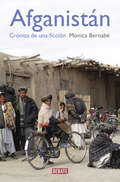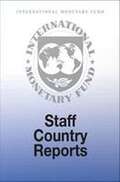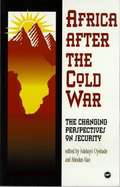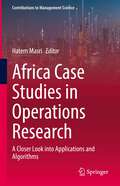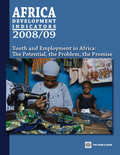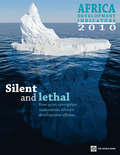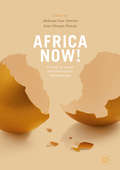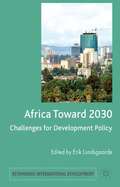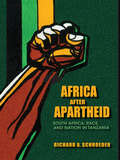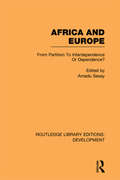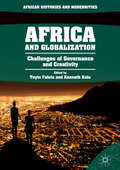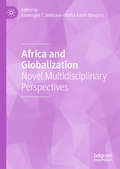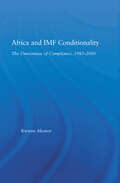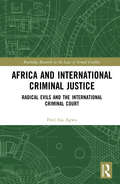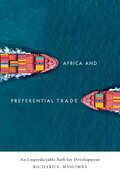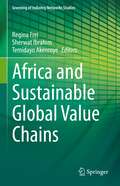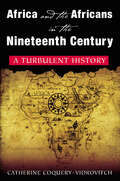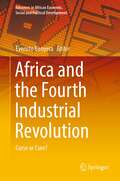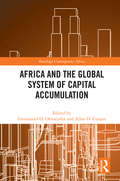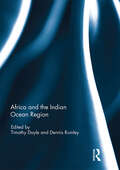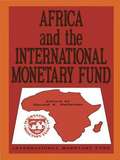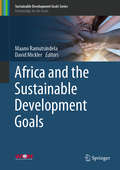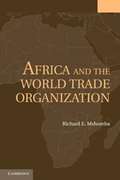- Table View
- List View
Afganistán: Crónica de una ficción
by Mónica BernabéLa historia reciente de Afganistán narrada por la única corresponsal española que vive en el país. Afganistán se ha convertido en un nombre cotidiano sin quererlo, en una imposición política, en un conflicto no deseado que, tras muchos años de lucha, sigue sin resolverse. Mònica Bernabé es la única periodista española que vive en Afganistán, una observadora privilegiada que nos cuenta la historia del país a través de su experiencia y narra los acontecimientos que han marcado una década: desde la caída del régimen talibán en el año 2001 hasta la quema de coranes de 2012, pasando por la violencia endémica contra las mujeres y el mito del burqa, las duras condiciones de vida en el frente, la nueva estrategia de Obama o la realidad de las tropas españolas en el país. Bernabé da voz al pueblo afgano en una crónica extraordinaria que se aleja de toda manipulación mediática y revela la verdad sobre el conflicto que ha conseguido desacreditar la política intervencionista de Occidente.
AfricInvest: A Pan-African Investment Platform
by Victoria Ivashina Youssef Abdel AalThe case is set in December 2018, when Ziad Oueslati, co-managing director and co-founder of AfricInvest, a leading pan-African private equity firm headquartered in Tunisia, was reflecting on the future direction of his firm. AfricInvest started as a traditional small and mid-cap private equity fund, but over the years had expanded into multiple adjoined investment strategies. At the end of 2018, the team saw an opportunity in the venture capital (VC) space, but while some were adamant about the need to raise a VC fund, others were reluctant to add yet another strategy to AfricInvest diverse investment strategies. The case presents a detailed insight into AfricInvest journey from a $10 million Tunisian fund, to becoming a prominent regional player operating throughout the African continent with $1.5 billion of assets under management. Among other issues related to the firm's growth, the case provides insights into the challenges of operating in such a wide and varied geography as the African continent. The case also offers details on their multiple investment strategies, ranging from small-cap SME focused funds, to sector-specific funds, cross-border funds, and private credit. The case explores the synergies and challenges associated with such as wide-reaching investment platform. This is described against the backdrop of the collapse of Abraaj, a leading emerging market private equity firm, in a scandal that shook the investment community in the region. The case also touches upon the role of development finance institutions (DFIs) as investors in emerging markets and the challenges of defining and measuring impact investing. The opportunity of launching a pan-African VC fund in the context of the recent collapse of Abraaj brings to the forefront several strategic questions for AfricInvest's co-founders: Should they keep expanding into new strategies, or would it be better to roll back their existing ones to focus only on their flagship private equity funds?
Africa After The Cold War: The Changing Perspectives On Security
by Abiodun Alao Adebayo OyebadeAlthough it is widely recognized that Africa's security problems are acute, it has never been a subject of much intellectual inquiry. This lack of scholarly discourse on the many dimensions of the problem of African security is the major consideration for this book. The approach to the question of security in this book differs markedly from the traditional approach that gives primacy to the threat of military aggression as sole factor in state security. A departure must be made from this dominant preoccupation in a new global order that has seen profound changes. The authors then place primacy on the complex problems of ethno-religious nationalism, economic stagnation, catastrophic civil wars, environmental degradation and the prospects for democratic structures in considering Africa's security issues after the Cold War.
Africa Case Studies in Operations Research: A Closer Look into Applications and Algorithms (Contributions to Management Science)
by Hatem MasriThis book presents contributions to the 50th Annual Conference of the Operations Research Society of South Africa (ORSSA), which was jointly hosted with the African Federation of Operations Research Societies (AFROS) at North-West University in Potchefstroom, South Africa from 12 to 15 September, 2021. Focusing on innovative case studies and recent applications of Operations Research models and algorithms in African countries, each chapter highlights findings emerging from the countries in question and explains the lessons learned. As such, the book offers an up-to-date overview of Operations Research practices and developments in Africa. AFROS is a “not for profit” organization that aims to promote Operations Research in Africa. Its affairs are regulated by an Executive Committee consisting of representatives/alternates of all its member societies. The members of the Federation undertake to co-operate in the advancement of knowledge, interest and education in Operations Research by appropriate means, particularly the exchange of information, the holding of meetings and conferences, and the awarding of prizes.
Africa Development Indicators 2008/09
by World BankAfrica Development Indicators 2008/09 (ADI) provides the most detailed collection of data on Africa available in one volume. It puts together data from different sources, making it an essential tool for policy makers, researchers, and other people interested in Africa. This year's ADI addresses the issue of youth employment. The report shows that success in addressing youth employment in will not be achieved and sustained through fragmented and isolated interventions. Instead it finds that an arching guideline for addressing the youth employment challenge is the need for an integrated strategy for rural development, growth and job creation - which covers the demand and the supply sides of the labor market and takes into account the youth mobility from rural to urban areas - combined with targeted interventions to help young people overcome disadvantages in entering and remaining in the labor market. This edition includes the Africa Development Indicators 2008/09 Single User CD-ROM and opening articles from leading economists reporting and analyzing key African economic and development issues.
Africa Development Indicators 2010
by World BankReliable quantitative data are essential for understanding economic, social and governance development because it provides evidence, and evidence are crucial to set policies, monitor progress and evaluate results. 'Africa Development Indicators 2010' (ADI) provides the most detailed collection of data on Africa available. It puts together data from different sources, and is an essential tool for policy makers, researchers, and other people interested in Africa. The opening articles of the 'ADI 2010' print edition focus on behaviors that are difficult to observe and quantify, but whose impact on service delivery and regulation has adverse long-term effects on households. The term 'quiet corruption' is introduced to indicate various types of malpractice of frontline providers (teachers, doctors, and other government officials at the front lines of service provision) that do not involve monetary exchange. The prevalence of quiet corruption and its long-term consequences might be even more harmful for developing countries, and for the poor in particular who are more exposed to adverse shocks to their income and are more reliant on government services to satisfy their most basic needs.
Africa Development Indicators 2011
by the editors at The World BankReliable quantitative data are essential for understanding economic, social and governance development because it provides evidence, and evidence are crucial to set policies, monitor progress and evaluate results. Africa Development Indicators 2010 (ADI) provides the most detailed collection of data on Africa available. It puts together data from different sources, and is an essential tool for policy makers, researchers, and other people interested in Africa.
Africa Now!: Emerging Issues and Alternative Perspectives
by Adebusuyi Adeniran Lanre IkuteyijoThis book presents relevant and timely endogenous procedures for addressing the challenge of transforming ideas into sustainable opportunities in Africa. It explores how Africa could be understood in the context of emerging global realities, providing alternative frameworks that will not just be participatory in conception and practice, but equally show a contextual workability for the varying aspects of the developmental enterprise in Africa. Despite having alternative and less cumbersome sources of funding, with commendable economic growth indices, and several economies among the fastest growing globally, African countries have been unable to transmute related opportunities into sustainable human development outcomes for majority of its citizenry. Over four rich sections the authors cover subjects ranging from environment and natural resource management, to governance, economy and sustainable development. The book continues with a section on Education and Human Development and a case study in transnationalism. The final section discusses crime, conflict and regional dynamics, including highly disputed topics such as forced migration and sex trade. This indispensable resource will be of great use to students and researches globally in fields such as sociology, anthropology, environmental studies, politics and economics with a focus on contemporary Africa, as well as to policy planners and human rights activists invested in the future development of Africa.
Africa Toward 2030
by Erik LundsgaardeWith the deadline of the Millennium Development Goals approaching, governments are considering the main elements for a global development policy reference system after 2015. Adapting insights from the scenario analysis tradition, the contributors identify six major underlying causes of change and key uncertainties affecting Africa's development prospects. The drivers of change considered vital in shaping Africa's future include demography, climate change, technology and innovation, domestic political development, new actors in international development, and global governance. The book outlines several generalized scenarios for the continent's future and discusses the implications of the changing African development context for the priorities and organization of European development cooperation.
Africa after Apartheid: South Africa, Race, and Nation in Tanzania
by Richard A. SchroederTracing the expansion of South African business into other areas of Africa in the years after apartheid, Richard A. Schroeder explores why South Africans have not always made themselves welcome guests abroad. By looking at investments in Tanzania, a frontline state in the fight for liberation, Schroeder focuses on the encounter between white South Africans and Tanzanians and the cultural, social, and economic controversies that have emerged as South African firms assume control of local assets. Africa after Apartheid affords a penetrating look at the unexpected results of the expansion of African business opportunities following the demise of apartheid
Africa and Europe: From Partition to Independence or Dependence? (Routledge Library Editions: Development)
by Amadu SesayIt is now over 100 years since the Berlin Conference of 1884 which started the ‘Scramble for Africa’ whereby the various European powers carved up the African Continent between themselves. During the last century the relationship between Africa and Europe has changed dramatically – from a colonial to a post-colonial relationship, with, more recently, new patterns emerging as the Communist bloc has developed increasingly strong links with some countries and as the EEC as an institution has got more involved. First published in 1986, this book explores how the relationship between Africa and Europe has changed over the last hundred years, assesses the current state of relations and discusses how the relationship may develop in the future.
Africa and Globalization: Challenges Of Governance And Creativity (African Histories And Modernities #51)
by Toyin Falola Kenneth KaluOffers thoughtful, accessible analysis of how African states have responded to the challenges of globalization.<P> Presents policy recommendations for helping African states to play more active and profitable roles in the global economy.<P> Includes perspectives from a wide variety of disciplines, including political science, economics, development studies, gender studies, and film studies.<P>This book considers the promises and challenges of globalization for Africa. Why have African states been perennially unable to diversify their economies and move beyond export of primary produce, even as Southeast Asia has made a tremendous leap into manufacturing? What institutional impediments are in play in African states? What reforms would mitigate the negative effects of globalization and distribute its benefits more equitably? Covering critical themes such as political leadership, security challenges, the creative sector, and community life, essays in this volume argue that the starting point for Africa’s meaningful engagement with the rest of the world must be to look inward, examine Africa’s institutions, and work towards reforms that promote inclusiveness and stability.
Africa and Globalization: Novel Multidisciplinary Perspectives
by Abdul Karim Bangura Kelebogile T. SetiloaneThis edited volume examines the challenges of globalization in light of the need to revisit and reconceptualize the notion of Pan-Africanism. The first part of the book examines globalization and Africa’s socioeconomic and political development in this century by using the Diopian Pluridisciplinary Methodology. This approach is imperative because the challenges faced by Africa vis-à-vis globalization and socioeconomic development are so multiplexed that no single disciplinary approach can adequately analyze them and yield substantive policy recommendations. The chapters in the second part analyze the imperatives for Africa’s global knowledge production, development, and economic transformation in the face of the pressures of globalization. Part two demonstrates an urgent need for Africa’s significant participation in the global knowledge economy in order to meet the continent’s modern transformation and development aspirations. The final part examines lessons from old and new Pan-Africanism and how they can be utilized to deal with the challenges emanating from the forces of modern globalization. With its multidisciplinary approach to a wide range of pressing, modern issues for the African content, this book is essential reading for scholars across the social sciences interested in where Africa is now and where it should go in this increasingly globalized world.
Africa and IMF Conditionality: The Unevenness of Compliance, 1983-2000 (African Studies)
by Kwame AkonorGhana was one of the first African countries to adopt a comprehensive IMF reform program and the one that has sustained adjustment longest. Yet, questions of Ghana's compliance - to what extent did it comply, how did it manage compliance, what patterns of non-compliance existed, and why? - have not been systematically investigated and remain poorly understood. This book argues that understanding the domestic political environment is crucial in explaining why compliance, or the lack thereof, occurs. Akonor maintains that compliance with IMF conditionality in Ghana has had high political costs and thus, non-compliance occurred once the political survival of a regime was at stake.
Africa and International Criminal Justice: Radical Evils and the International Criminal Court (Routledge Research in the Law of Armed Conflict)
by Fred Aja AgwuThis book provides an overview of crimes under international law, radical evils, in a number of African states. This overview informs a critical analysis of the debates surrounding the African Union’s call for withdrawal from the International Criminal Court and proposes a way forward with a more pertinent role for the Court. The work critically analyzes the arguments around withdrawal from the ICC and the extension of the jurisdiction of the African Court into criminal matters. It is held that this was not intended in the spirit of complementarity as envisaged by the Rome Statute, and is subject to political calculation and manipulation by national governments. Recasting the ICC as a court of second instance would provide a stronger institutional and jurisdictional regime. The book will be a valuable resource for students, academics, and policymakers working in the areas of international humanitarian law, international criminal law, African studies, and genocide studies.
Africa and Preferential Trade: An Unpredictable Path for Development
by Richard E. MshombaNonreciprocal preferential trade arrangements are a defining feature of the relationship between developed and developing countries dating back to the colonial era. In the late 1950s, these arrangements started to take a multilateral form when members of the European Economic Community established special trade arrangements with their colonies. Since then, several trade arrangements have featured African countries among the preference-receiving countries. Yet it is not always clear how preferential these arrangements are and whether they in fact help African countries or instead lead them to perpetual dependence on specific markets and products. Richard E. Mshomba carefully examines the history of these programs and their salient features. He analyzes negotiations between the EU and African countries to form Economic Partnership Agreements. Nonreciprocal preferential trade arrangements are often unpredictable, since the duration and magnitude of preferences are at the discretion of the preference-giving countries. However, when used in conjunction with other development programs and with laws and regulations that encourage long-term investment and protect employees, they can increase economic opportunities and foster human development. This book recognizes the potential impact of nonreciprocal preferential trade arrangements and provides recommendations to increase their viability.
Africa and Sustainable Global Value Chains (Greening of Industry Networks Studies #9)
by Regina Frei Sherwat Ibrahim Temidayo AkenroyeThis book contains a collection of studies on the interactions between businesses in Africa and Global Value Chains (GVCs) in terms of social, environmental and economic sustainability. This is particularly pertinent given the asymmetrical power distribution between the global buyer and the African supplier, their governance relationships and the ongoing competitive pressures to reduce costs and increase flexibility to meet GVC demands. Rather than focusing on the sustainability of a single organization, GVCs address the sustainability of inter-firm value chains and global industries as a whole. With little differentiation between value chain creation and social / environmental degradation extending to people and raw material extraction (upstream) and disposal or recycling (downstream), sustainability issues need to be at the forefront of African business research interests. Nowadays, sustainability is considered a competitive advantage for a firm looking to join a GVC. Whether sustainability is approached from the viewpoint of an exporting firm motivated to join a GVC in its respective industry or whether a firm’s continuing contractual or collaborative relationship with a buyer depends on its compliance with sustainability standards, both approaches focus on the ability of firms in Africa to benefit from joining sustainable GVCs.
Africa and the Africans in the Nineteenth Century: A Turbulent History
by Mary Baker Catherine Coquery-VidrovitchMost histories seek to understand modern Africa as a troubled outcome of nineteenth century European colonialism, but that is only a small part of the story. In this celebrated book, beautifully translated from the French edition, the history of Africa in the nineteenth century unfolds from the perspective of Africans themselves rather than the European powers.It was above all a time of tremendous internal change on the African continent. Great jihads of Muslim conquest and conversion swept over West Africa. In the interior, warlords competed to control the internal slave trade. In the east, the sultanate of Zanzibar extended its reach via coastal and interior trade routes. In the north, Egypt began to modernize while Algeria was colonized. In the south, a series of forced migrations accelerated, spurred by the progression of white settlement.Through much of the century African societies assimilated and adapted to the changes generated by these diverse forces. In the end, the West's technological advantage prevailed and most of Africa fell under European control and lost its independence. Yet only by taking into account the rich complexity of this tumultuous past can we fully understand modern Africa from the colonial period to independence and the difficulties of today.
Africa and the Fourth Industrial Revolution: Curse or Cure? (Advances in African Economic, Social and Political Development)
by Everisto BenyeraThis book examines the epistemological, political, and socio-economic consequences of the Fourth Industrial Revolution (4IR) for Africa. Presenting various case studies on epistemic freedom, theology, race and robotics, tertiary education, political and economic transformation, human capital, and governance, it debates whether the 4IR will be part of the solution to the African problem, namely that of coloniality in its various forms. Solving the African problem using the 4IR requires ethical, just and epistemologically independent leadership. However, the lack of ICT infrastructure militates against Africa’s endeavours to make the 4IR a problem-solving moment. To its credit, Africa possesses some of the major capital needed (human, mineral, and social), and it constitutes a huge market comprising a young population eager to participate in the 4IR as problem-solvers and not as a problem to be solved—as equal citizens and not as the marginalized other.
Africa and the Global System of Capital Accumulation (Routledge Contemporary Africa)
by Emmanuel O. OritsejaforAfrica and the Global System of Capital Accumulation offers a groundbreaking analysis of the strategic role Africa plays in the global capitalist economy. The exploitation of Africa’s rich resources, as well as its labor, make it possible for major world powers to sustain their authority over their own middle-class populations while rewarding African collaborators in leadership positions for subjecting their populations into poverty and desperation. Middle-class obsessions such as computers, mobile phones, cars and the petroleum that fuels them, diamonds, chocolate – all of these products require African resources that are typically obtained by child or slave labor that helps to generate billionaires out of foreign investors while impoverishing most Africans. Oritsejafor and Cooper demonstrate that "primitive accumulation," believed by both Adam Smith and Karl Marx to be a process that precedes capitalism, is actually an integral part of capitalism. They also validate the thesis that capitalism incorporates racism as an organizing tool for the exploitation of labor in Africa and on a global scale. Case studies are presented on Nigeria, Cote d’Ivoire, Ghana, Liberia, Congo, Tanzania, Somalia, Angola, Namibia, Sao Tome and Principe, and South Sudan. There are also chapters analyzing the interests of Russia and China in Africa. This book will be of interest to students and scholars of African politics, development, and economics.
Africa and the Indian Ocean Region
by Timothy Doyle Dennis RumleyThis book examines the presence of Africa as a significant force in the western Indian Ocean. Africa will increasingly play a pivotal role in the future of the geopolitics of the Indian Ocean region. The book considers the scope for greater African involvement in Indian Ocean region-building activities, and seeks to encourage a western Indian Ocean dialogue. The book publishes some of the best papers presented at an Indian Ocean Research Group (IORG Inc.) symposium held in Nairobi, Kenya, in 2013, entitled "The Political Economy of Maritime Africa in the Indian Ocean Region." This symposium was part of a larger project on constructing a sense of "Indian Oceanness". Chapters include: India’s new policy of engagement with Africa; China’s growing presence in the Indian Ocean Region; security strategies in the Western Indian Ocean; the increasing importance and significance of the Western Indian Ocean littoral; and cultural linkages between Africa and the Indian Ocean region. This book was previously published as a special issue of the Journal of the Indian Ocean Region.
Africa and the Sustainable Development Goals (Sustainable Development Goals Series)
by Maano Ramutsindela David MicklerThe book draws upon the expertise and international research collaborations forged by the Worldwide Universities Network Global Africa Group to critically engage with the intersection, in theory and practice, of the Sustainable Development Goals (SDGs) and Africa’s development agendas and needs. Further, it argues that – and demonstrates how – the SDGs should be understood as an aspirational blueprint for development with multiple meanings that are situated in dynamic and contested terrains. As the SDGs have substantial implications for development policy and resourcing at both the macro and micro levels, their relevance is not only context-specific but should also be assessed in terms of the aspirations and needs of ordinary citizens across the continent. Drawing on analyses and evidence from both the natural and social sciences, the book demonstrates that progress towards the SDGs must meet demands for improving human well-being under diverse and challenging socio-economic, political and environmental conditions. Examples include those from the mining industry, public health, employment and the media. In closing, it highlights how international collaboration in the form of research networks can enhance the production of critical knowledge on and engagement with the SDGs in Africa.
Africa and the World Trade Organization
by Richard E. MshombaMshomba provides a systematic study of Africa as it relates to the World Trade Organization. He examines the WTO's enforcement mechanism; the WTO's broadened mandate, illustrated by the Agreement on Trade-Related Intellectual Property Rights; agriculture in the Doha Round; issues relating to transparency in government procurement; and the endeavor to streamline assistance to developing countries through an "Aid for Trade" initiative. The author integrates theory and practice, with a clear presentation of important economic concepts. He provides a rigorous analysis of key issues and proposals. He presents African countries as having an important role to play in the WTO, especially as they actively engage in bargaining through various coalitions. Mshomba acknowledges that WTO negotiations will always be complex and at times contentious due to wide economic and political differences between countries. He views the differences, however, as creating opportunities for a mutually beneficial exchange of goods, services, and ideas.
